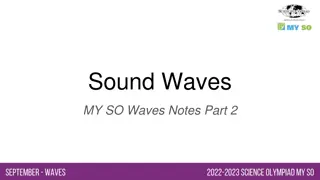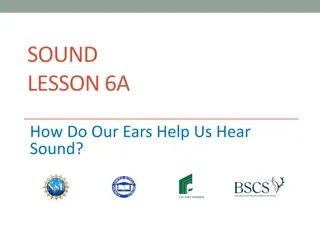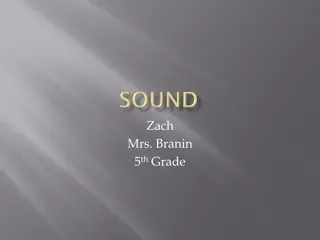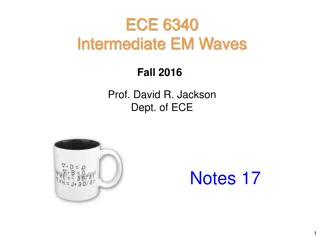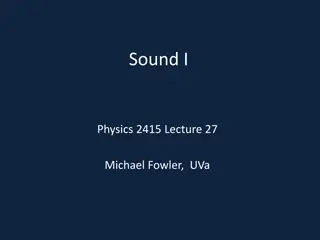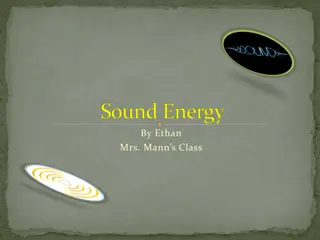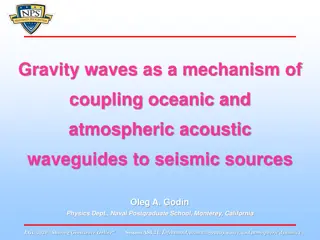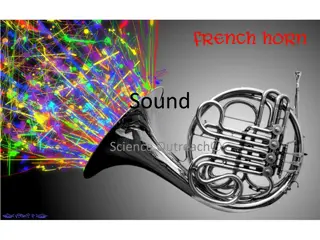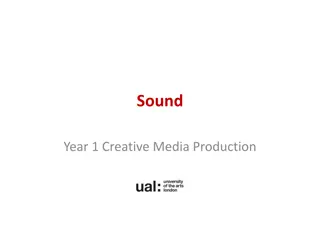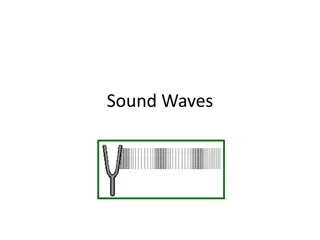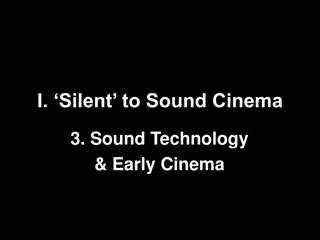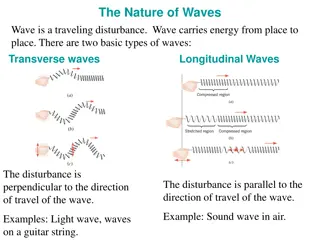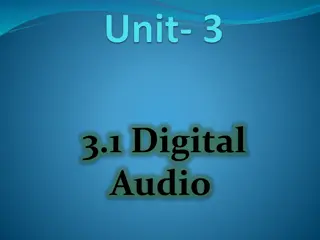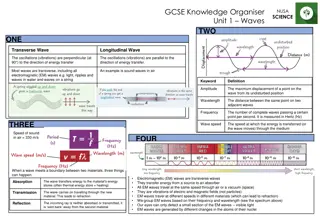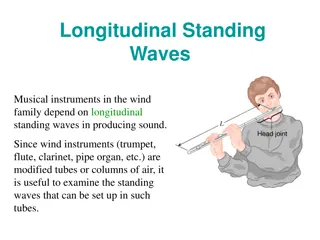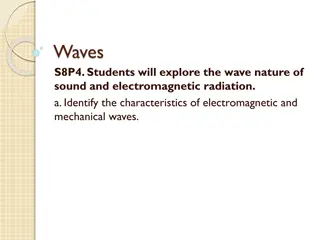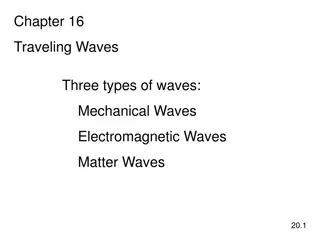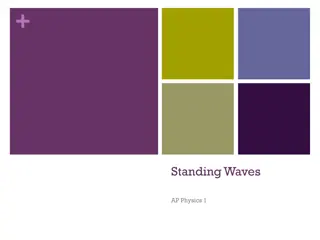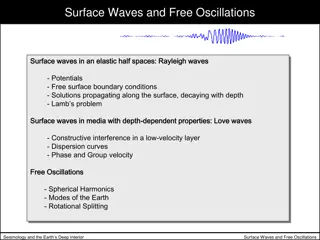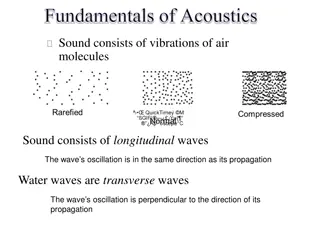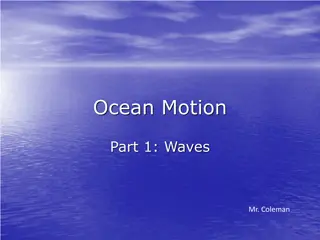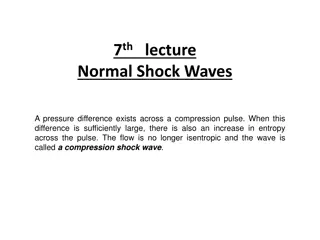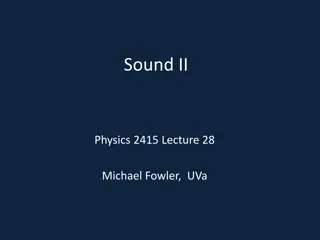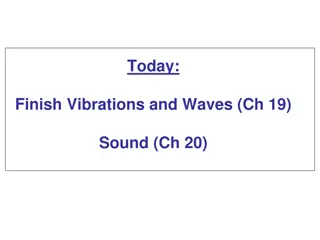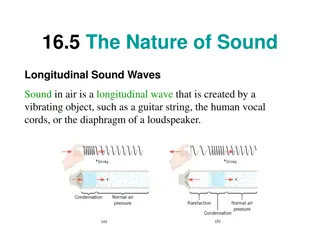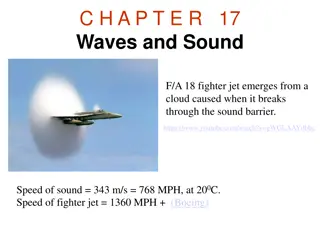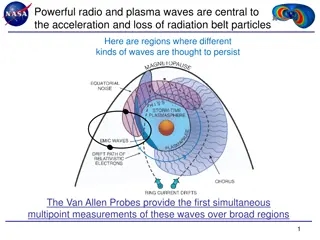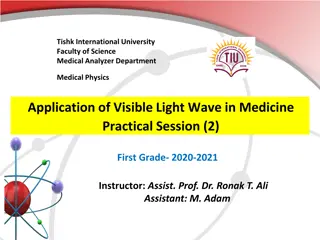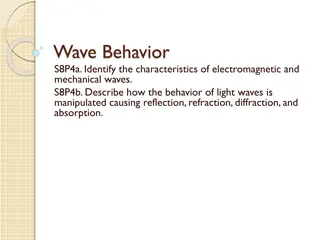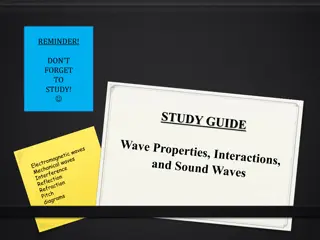Understanding Sound Waves and Human Hearing
Sound waves are longitudinal waves where particles move in the same direction. The human body hears sounds through vibrations reaching the cochlea, which produces electrical signals for the brain to interpret. Properties of sound waves include traveling through various mediums at different speeds. F
2 views • 10 slides
Understanding Earth's Interior through Seismic Waves: Part 1
Seismic waves provide crucial evidence about Earth's composition and structure. By analyzing the behavior of primary, secondary, and surface waves, scientists can determine the different layers and materials within the Earth. Primary waves travel through both solid and liquid parts, while secondary
10 views • 10 slides
Understanding Types of Waves and Energy Transport
Explore the different types of waves such as transverse, longitudinal, and surface waves, along with electromagnetic waves. Learn about their properties, how they move through mediums, and their significance in various applications like sound transmission, earthquake detection, and energy transport.
3 views • 10 slides
Exploring Types of Waves and Energy Transport
Discover the various types of waves such as transverse, longitudinal, surface, and electromagnetic waves, along with their characteristics and applications in energy transportation. Learn about the differences between mechanical and electromagnetic waves, how waves transmit energy, and their signifi
3 views • 10 slides
Understanding the Conversion of Sound to Digital Data with ADC
Sound waves are converted into digital data using an Analog-to-Digital Converter (ADC) to enable computer processing. The ADC captures snapshots of the sound wave at specific intervals, turning them into numerical codes that computers can interpret. The sample rate determines the frequency of these
1 views • 18 slides
Understanding Sound Waves and How They Travel
Explore the fascinating world of sound waves and their behavior as they travel through various mediums. Learn about the generation of longitudinal waves, the importance of a medium for sound propagation, and the factors influencing the speed of sound such as elasticity, density, and temperature. Dis
2 views • 15 slides
Exploring How Our Ears Help Us Hear Sound
Discover the intricate relationship between our ears and the sounds we hear. Uncover key science ideas about sound transmission and the role of our ears in capturing and interpreting sound waves. Engage in hands-on activities with kazoos and wax paper to understand vibration and sound detection. Sha
0 views • 17 slides
Understanding Waves: A Visual Exploration
Explore the fascinating world of waves through visually engaging images and interactive clickers. Learn about different types of waves, including longitudinal and transverse waves, and discover what waves carry - energy, not matter. Delve into the concepts of mechanical and electromagnetic waves, an
1 views • 37 slides
Understanding Sound Waves and Vibration in Music
Dive into the world of sound waves and vibrations with this educational content. Explore how vibrations spread from vibrating objects, how different instruments produce sound, and the concepts of compression, rarefaction, solids, liquids, and gases in relation to sound. Discover the factors that aff
0 views • 9 slides
Understanding General Plane Waves in Electromagnetic Theory
This study focuses on the analysis of general plane waves in electromagnetic theory, covering topics such as the general form of plane waves, Helmholtz equation, separation equation, wavenumber vector, Maxwell's equations for plane waves, and the symbolic representation of plane waves. The content d
0 views • 41 slides
Understanding Interference and Beats in Waves
Explore the fascinating phenomena of interference and beats in waves, where overlapping waves interact to create patterns of constructive and destructive interference. Witness how sound waves can also produce beats when interfering in time, resulting in a slow envelope effect. Delve into the princip
0 views • 40 slides
Understanding Sound Waves and Their Effects
Sound travels through sound waves, which can go through matter and interact with various surfaces in different ways. Factors such as frequency, energy, and surface characteristics affect how sound behaves, including pitch alteration, volume changes, reflection, absorption, and echo creation. Echoloc
0 views • 9 slides
Understanding Sound Waves: Exploring Wave Phenomena in Physics
Delve into the intricacies of sound waves in Physics with a focus on standing waves, boundary conditions, amplitude variations, and wave interactions. Explore concepts like harmonic wave addition, pulse encounters, and outcomes at fixed and free ends of a string. Discover how different scenarios aff
0 views • 22 slides
Sound Energy by Ethan, Mrs. Mann's Class
Sound Energy by Ethan in Mrs. Mann's class is a captivating educational project showcasing different aspects of sound energy through engaging experiments and activities. The project, which delves into the fascinating world of sound waves and vibrations, provides valuable insights into the concept of
0 views • 10 slides
Gravity Waves as a Mechanism of Coupling Oceanic and Atmospheric Acoustic Waveguides to Seismic Sources
Direct excitation of acoustic normal modes in horizontally stratified oceanic waveguides is negligible for shallow earthquakes due to velocity disparities. This study evaluates the contribution of scattering by hydrodynamic waves in generating abyssal T-waves. The research explores the role of scatt
1 views • 6 slides
Exploring the Science of Sound: Wavelengths, Speed, and Experiments
Delve into the fascinating world of sound with this engaging content, covering the fundamentals of sound waves, compression waves, the speed of sound in different mediums, and how to measure it. Get ready for a hands-on experiment to further your understanding of sound science!
0 views • 6 slides
Understanding Sound: Energy, Pitch, Transmission, and Speed
Sound is a form of energy that travels through a medium by vibrations. It carries intensity and pitch, with frequency determining pitch. Sound requires a medium to travel, unlike light. Elasticity and temperature of the medium affect the speed of sound transmission. Understanding how sound waves pro
0 views • 12 slides
Understanding Different Types of Sound in Media Production
Explore the various types of sound in media products, including diegetic, non-diegetic, offscreen sound, sonic flashback, synchronous sound, asynchronous sound, ambient sound, contrapuntal sound, sound effects, and pleonastic sound. Learn how each type enhances storytelling and creates immersive exp
1 views • 14 slides
Exploring Essential Questions About Sound Waves
Delve into the fundamental aspects of sound waves through essential questions, observations of sound wave behavior, key facts, and measurements. Understand the nature of sound waves, including frequency, amplitude, speed of sound, and perception attributes like pitch and intensity level. Discover ho
0 views • 20 slides
Discovering the World of Sound: Chapter 12 Activities and Concepts
Experience a sound hunt activity, explore the science of vibrations and sound waves, and learn about how sound travels through different mediums. Dive into the fascinating world of echoes, dolphin navigation, and the human ear's perception of sound in this dynamic chapter.
0 views • 16 slides
Evolution of Sound Technology in Cinema: A Historical Perspective
Explore the transition from silent to sound cinema and the impact of sound technology on early cinema. James Lastra's work on sound in film and the significance of aural perception in modernity are highlighted, along with discussions on performance, inscription, and synchronization in sound imaging
0 views • 25 slides
Exploring the Nature of Waves and Sound
Understanding the nature of waves, both transverse and longitudinal, and their properties such as amplitude, wavelength, and frequency. Delve into the world of water waves, periodic waves, and the speed of waves on a string. Learn about the longitudinal nature of sound waves, the audible frequency r
0 views • 16 slides
Understanding Digital Audio and Sound Characteristics in Multimedia
This content delves into key aspects of digital audio and sound characteristics in the realm of multimedia technology. It covers topics such as the nature of sound waves, the classes of sound including voice and music, digitizing sound, calculating audio data sizes, and the creation of digital audio
0 views • 51 slides
Understanding Waves: Properties, Behaviors, and Applications
Waves come in different forms - transverse and longitudinal - each with distinct characteristics and behaviors. Understanding concepts like amplitude, wavelength, frequency, and wave speed is crucial in grasping how waves transfer energy through different materials. The interaction of waves with bou
0 views • 9 slides
Understanding Longitudinal Standing Waves in Musical Instruments and the Human Ear Canal
Musical instruments in the wind family rely on longitudinal standing waves to produce sound, with wind instruments like trumpet, flute, clarinet, and pipe organ being modified tubes of air. This article explores the concept of standing waves in open tubes of air and their relevance to instruments an
0 views • 4 slides
Understanding Waves: Characteristics and Types Explained
Explore the wave nature of sound and electromagnetic radiation, distinguishing between electromagnetic and mechanical waves. Waves are energy-carrying disturbances that do not transport matter. Mechanical waves require a medium for energy transfer, while electromagnetic waves can travel through spac
0 views • 26 slides
Understanding Traveling Waves: Types, Properties, and Equations
Explore the world of traveling waves, including mechanical, electromagnetic, and matter waves. Learn about transverse and longitudinal wave motion, the speed of waves in strings, wave frequency, wavelength, and speed relationships, as well as wave equations for non-repeating waves over space and tim
1 views • 30 slides
Understanding Standing Waves in Physics
Standing waves in physics are periodic waves that result from the interference of reflected and inverted waves, creating nodes and antinodes along a medium. These standing wave patterns can be observed in vibrating strings, such as guitar strings, where specific frequencies produce distinct harmonic
0 views • 29 slides
Surface Waves and Free Oscillations in Seismology
Exploring surface waves, potentials, and free oscillations in seismology with a focus on Rayleigh waves, Love waves, and wave equations. Understand the dispersion relation, geometry, and solutions for waves propagating in elastic half spaces and media with depth-dependent properties.
0 views • 55 slides
Understanding Fundamentals of Acoustics: Waves, Frequencies, and the Doppler Effect
Sound involves vibrations of air molecules, with sound waves being longitudinal and water waves transverse. The transduction of sound into mechanical energy in the ear allows us to hear and perceive frequency/pitch. Exploring the Doppler Effect enhances our understanding of how motion affects sound
0 views • 10 slides
Understanding Ocean Waves and Their Dynamics
Exploring the science behind ocean waves, this resource delves into why waves occur, the components of a wave, how water moves within a wave, and the effects of waves hitting a beach. From defining waves to discussing wave characteristics, this content provides valuable insights into the fascinating
0 views • 13 slides
Understanding Normal Shock Waves in Gas Dynamics
In gas dynamics, normal shock waves occur when there is a significant pressure difference across a compression pulse, leading to increased entropy. This results in non-isentropic flow known as compression shock waves. The formation of compression and expansion waves can be likened to piston movement
0 views • 16 slides
Understanding Sound Waves: Harmonic Vibrations and Longitudinal Waves
Exploring the concepts of harmonic string vibrations in musical instruments, longitudinal waves in pipes, boundary conditions at pipe open ends, and the wave equation for waves in two and three dimensions. Topics include interference, Doppler effect, and wavelength calculations for standing harmonic
0 views • 19 slides
Understanding Sound: Vibrations, Waves, and Speed in Different Media
Explore the origins of sound through vibrations of objects like strings and vocal cords, and how these vibrations create longitudinal waves that travel through air. Learn about the speed of sound in different conditions, including moisture and temperature variations, and discover how sound travels i
0 views • 26 slides
Understanding Sound Waves: Nature, Properties, and Characteristics
Sound waves are longitudinal waves created by vibrating objects in air. They cannot propagate in a vacuum. Understanding how we hear involves exploring wave representations and the frequency ranges of sound waves, from infrasonic to ultrasonic. Sound also exhibits objective and subjective properties
0 views • 12 slides
Understanding Waves and Sound: A Visual Exploration
Explore the nature of waves and sound through a visual journey covering topics like transverse waves, longitudinal waves, water waves, periodic waves, wave speed, the speed of a wave on a string, the nature of sound, and the frequency of sound waves. Discover how waves carry energy, the different ty
1 views • 32 slides
Unveiling the Role of Radio and Plasma Waves in Particle Acceleration
Radio and plasma waves play a crucial role in the acceleration and loss of radiation belt particles. The Van Allen Probes provide groundbreaking multipoint measurements of these waves in various regions, shedding light on phenomena such as chorus waves and resonant wave acceleration. Strong correlat
0 views • 8 slides
Understanding Visible Light Waves in Medicine and Physics
Visible light waves play a crucial role in medicine and physics, where they are the only electromagnetic waves that humans can see. These waves create the colors of the rainbow with varying wavelengths, allowing us to perceive different colors and forms of light. Understanding the properties of visi
0 views • 22 slides
Understanding Light Wave Behavior: Reflection and Refraction
Explore the characteristics of electromagnetic and mechanical waves along with how light waves can be manipulated through reflection and refraction. Discover how reflection occurs when waves bounce off surfaces and how refraction bends waves as they move between different mediums, affecting their sp
0 views • 18 slides
Understanding Waves: Definitions and Characteristics
This educational content covers definitions and characteristics of waves, including transverse and longitudinal waves, how waves travel through a medium, interference, earthquake waves, sound properties like amplitude and pitch, the Doppler Effect, and differences between reflection and refraction.
0 views • 10 slides





